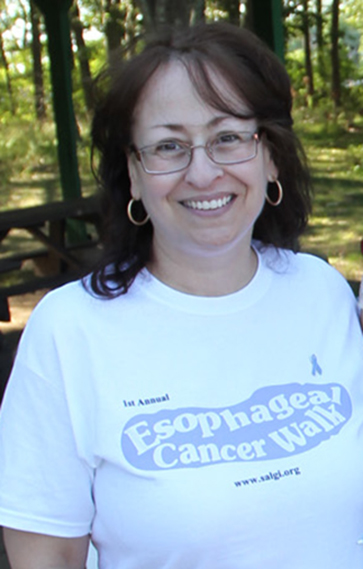Linda Molfesi is president of The Salgi Esophageal Cancer Research Foundation, which she and her family founded in 2011. The internationally recognized, Rhode Island-based nonprofit works to raise awareness, encourage early detection and fund research of esophageal cancer in hopes of a cure.
Molfesi’s father passed away from esophageal cancer in 1998. Molfesi began having similar symptoms as her father before his diagnosis. While an endoscopy found no pre-cancer or cancer, Molfesi and her family uncovered alarming facts about esophageal cancer as they did additional research into the disease.
They found there is little to no awareness of risk factors, with chronic reflux being the primary risk factor. Symptoms often occur late, once the cancer has spread, and most people are diagnosed in late stages when treatment options are limited. There are no standard or routine screenings to improve early detection, and the overall five-year survival rate has steadily been less than 20 percent. Making matters worse, she said, esophageal cancer research is critically underfunded by both government and private charities.
PBN: You became aware of the danger of esophageal cancer when your father was diagnosed with it, but there were warning signs beforehand. How many years did your father suffer from gastroesophageal reflux disease before he was diagnosed with cancer?
MOLFESI: For as long as I can remember, my father had suffered from heartburn and indigestion. Each time he would ask his doctors about it, they would state that it was “just heartburn,” nothing to worry about. It was not until he began having difficulty swallowing his food and felt as if he was “choking” that his doctor took him seriously. Through an endoscopy, it was discovered that my father had stage four esophageal cancer. He underwent surgery and chemo, but he passed away approximately one year later.
PBN: Can you describe the steps you’ve since taken to reduce your own risk?
MOLFESI: More than a decade after my father passed away from esophageal cancer, I started having similar “red flag” symptoms. I had always suffered from heartburn and other symptoms of acid reflux disease – also known as gastroesophageal reflux disease, or GERD – but even though my father had died of esophageal cancer, I hadn’t made the connection between the two.
An endoscopy showed that while there was some irritation in my esophagus, there was no Barrett’s esophagus – a sometimes precursor to cancer – and no esophageal cancer. I took anti-reflux medications for only a short period of time, as I learned they have major side effects. Instead, I have changed my diet and monitor the foods and drinks that I consume and avoid those that “trigger” my heartburn – a journal helps tremendously when starting this. I also use a wedge to elevate my mattress six inches at the top and I make sure to stay elevated after eating for at least three hours. I also insist on an endoscopy every five years.
PBN: What are the other red flag symptoms of esophageal cancer?
MOLFESI: Red flag symptoms include, but are not limited to, dysphagia – difficulty swallowing; chronic heartburn or indigestion; choking while eating or sensation that food is getting “stuck”; chest pain, pressure or burning; unexplained weight loss; chronic cough; hoarseness; vomiting; and coughing up blood. It is also important to note that having any of these symptoms does not automatically mean esophageal cancer. However, it is imperative that one speaks to their doctor and insists they undergo screening immediately.
PBN: Please describe the foundation’s major fundraiser and how people can contribute.
MOLFESI: Our major fundraising event each year is our annual Esophageal Cancer Walk/Run event, which is hosted at Warwick City Park in Warwick … on the Saturday of Father’s Day weekend. My father passed away on Father’s Day and it is a way to honor him and all of the men and women who have been impacted by this horrific cancer. This year, the 8th Annual Esophageal Cancer Walk/Run will take place on Saturday, June 15, at 10 a.m. at Warwick City Park. Those who would like to contribute may sign up as a guest, create an online fundraising page, donate directly to the fundraiser and there are also corporate sponsorships available. Those who are unable to join may still create an online fundraising page and/or donate to the fundraiser.
Due to the success of our previous annual walk/run events in Rhode Island and the other events held throughout the country, our charity funded esophageal cancer research twice in less than seven years since we founded.
The Salgi Foundation recently granted $62,000 to the Virginia Mason Medical Center’s development of a breath test for detecting esophageal cancer. Can you explain the importance of this work?
MOLFESI: Esophageal cancer is the fastest-growing cancer in the United States, with a 733 percent increase in the past four decades. While many suffer from heartburn and other symptoms of acid reflux disease, there is limited awareness of the fact that acid reflux can increase esophageal cancer risk. There is currently no routine or standard screening to detect esophageal cancer in earlier stages. An endoscopy is mainly used to screen for esophageal cancer but usually only once symptoms appear. Unfortunately, symptoms of esophageal cancer typically occur when the cancer has spread, and therefore the majority of people are diagnosed in advanced stages, when the cancer is much more difficult to treat. Patients diagnosed with late-stage esophageal cancer face a survival rate of only 4.8 percent.
The breath test that Virginia Mason Medical Center is researching would be able to not only screen a much larger pool of people but unlike endoscopy, is much less invasive. Also, the research that we funded will utilize the breath test to monitor patients undergoing treatments to see which treatments are more successful to hopefully improve and possibly expand treatment options and improve survival.
Rob Borkowski is a PBN staff writer. Email him at Borkowski@PBN.com.













